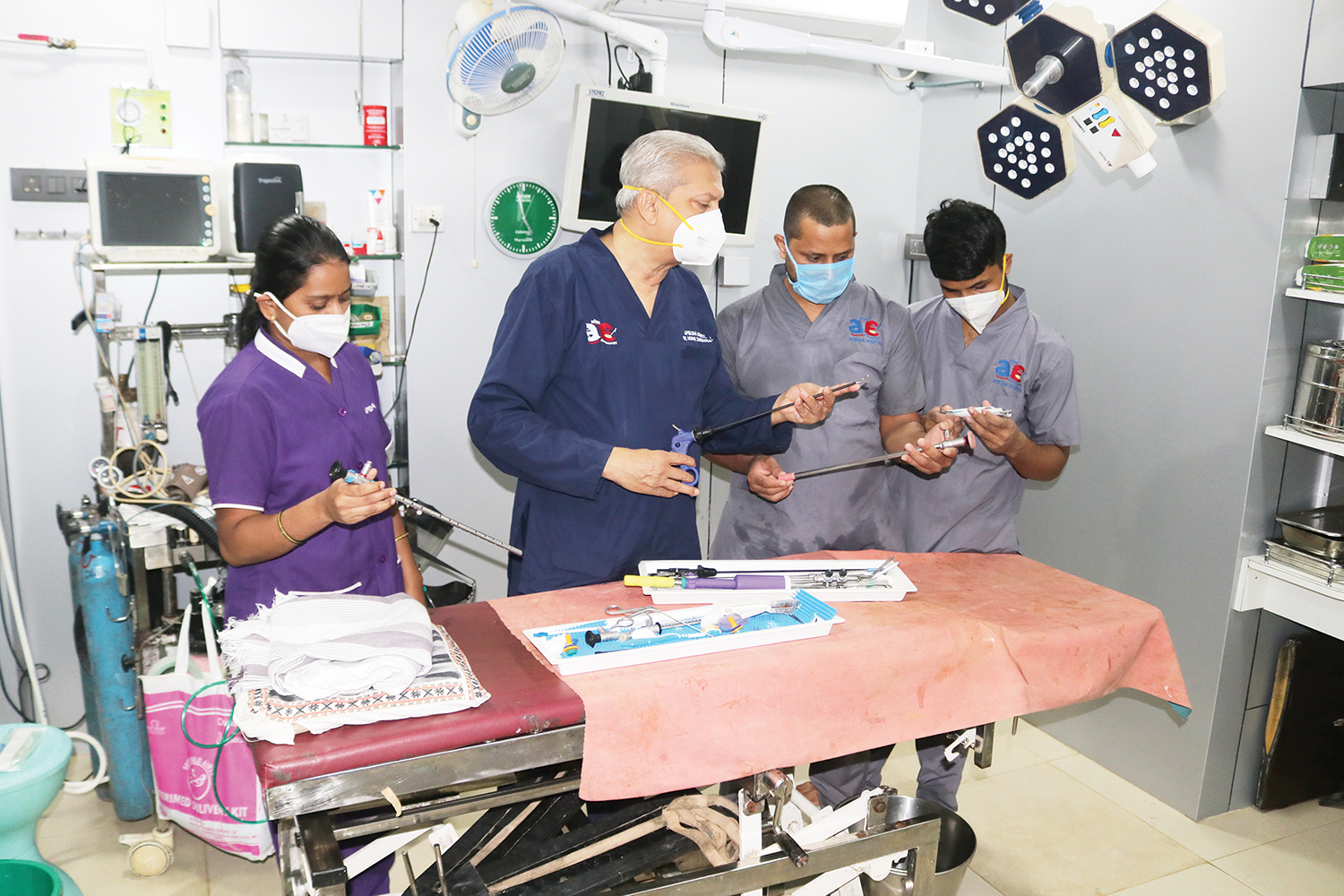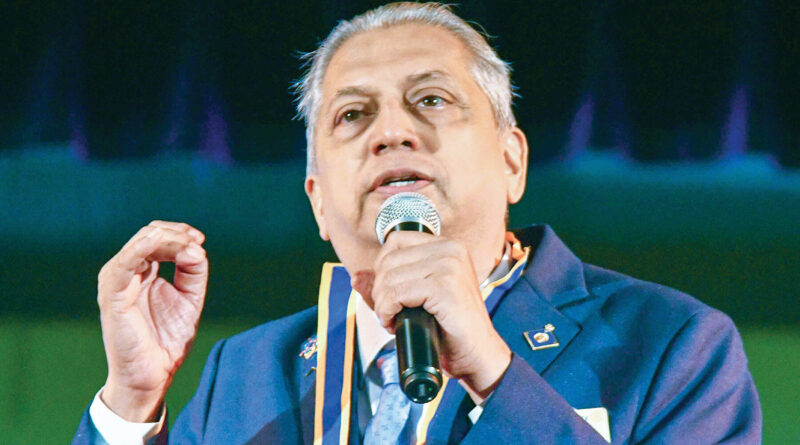Delivering Future!
A well-acclaimed gynaecologist with almost four decades of practice, a popular professor amongst his students, eloquent speaker, a humour writer, a past district governor of Rotary, Dr Mohan Chandavarkar is multi dimensional versatile personality. But above all he is one of the best human beings. Thane is proud of him. A valuable Thanekar indeed.
What made you choose the field of medicine?
Wouldn’t it sound a bit idealistic and romantic to say that right from my childhood I had an inclination towards medicine. The options in the 70’s was either medicine or engineering. My father and his family grew up from abject poverty in the village to their success in the city. We were told – that he wanted to be a doctor, but economically and facility wise it remained a dream. Maybe that was the subtle inspiration – I am happy it worked out for me as well as it fulfilled his dream.

Why did you opt for gynaecology?
One child, one teacher, one book and one pen can change the world” said – Malala Yousafzai.
That teacher for me was Dr SN Daftary at the Wadia Hospital and GS Medical College – my guru, guide, mentor, well wisher, critic, philosopher, hand holder, skill developer, and human being par excellence. I was inspired by him and sky was not the limit under his chhatrachhaya.
How challenging was it when you started your career?
In 1983, I was married had a small son and was a lecturer in a medical college- the salary would last for 15 days. Then, inspite of being a MD, I was still eating from my father’s plate. Veena’s father expressed a wish that when they were around, we should have our own setup. We searched from Alibag to Nashik and Vapi to Surat for opportunities. Inspired by Dr Daftary’s setup , we dreamt of a nursing home, without the availability of necessary finances. The cost of a place in Mahim, where I stayed was Rs 2500 / sqft. So like the Malyalee who goes to the Gulf for petrodollars, we came to Thane in May 1985 with Apeksha Nursing Home – the quintessential expatriate.
When did you start your own nursing home and how were the initial days?
Finance was at 18% pa and that too after giving the documents of your parents, inlaws and anybody the bank thought would bale us out, if there was a crisis. The practice grew like a typical pregnancy. It took time – a fairly long gestational period. We did not have a phone – I used to move around with 50 paise coins to be used at the Raymond gate PCO – to call an anaesthetist, to call a pediatrician. For personal calls, I had to given the number of a chemist at Vartakanagar. For sustenance, I used to travel to Cooper Hospital for duties as a lecturer. For the first three years we never ate out – there just wasn’t anything left to be called disposable. But slowly things picked up. As they say Naam Ek Din main Nahin banta, Par Thaan lo aur jidd, jigar, jaan, aur josh se kaam lo. To ek din ban hi jaata hain.

How many operations have been executed by you so far any count..
Frankly speaking, I don’t know as I have not kept a count. But have had the honour to teach at Rajiv Gandhi Medical College and Chhatrapati Shivaji Hospital, and the opportunity to operate at many corporate setups. As guesstimate, must have done more than 10,000 deliveries.
Can you share some of your experiences that you have had with your patients?
KS was a patient who delivered a second time normally in Mulund. She bled a lot and needed an obstetric hysterectomy there. Then she went into coagulation failure. She was shifted to Singhania Hospital. We stabilised her with many transfusions, but Dr Ashalata and I had to reopen as there was a lot of blood in the abdominal cavity. We had to take a death on table consent. Subsequently, KS went into ARDS needing the ventilator, renal shutdown needing dialysis, subcutaneous gangrene, and puerperal sepsis needing heavy antibiotics. But she fought and after 45 days ofstruggling to keep her afloat, she went home.
UM was a 30 year old who had suffered from four pregnancy losses. When she came to me, I told her PhD husband, I will manage this according to some empirical methods I have learnt from my guru – and you can help by not asking for evidence based action. He was desperate and agreed. She needed a cervical tightening and complete bed rest but finally she was blessed with a baby girl. Eyes streaming with tears the husband dis shastang namaskar to me in the waiting room- crying – “Doctor, Tumchya Mule Zhala”.Subsequently they relocated to the US. But for many a year whenever they visited India, they would come straight from the airport for a pilgrimage to Thane – associated with embarrassing namaskars. Even now, she always reconfirms the doctors treatment in the US with an early morning telephonic consult.
Isnt it natural that this abundant niswaarth affection is the elixir that keeps us going – i treat He heals.

How has the field of gynaecology evolved over a period of time?
Newer suture materials, newer surgical techniques, better anaesthesia equipment and drugs have made surgical interventions widely available, affordable and safe. In the gynec segment, new drugs eg for endometriosis and minimally invasive surgery have made – minimised hospitalisation, better postoperative pain care and quick recovery a routine option. In vitro fertilisation along with other assisted reproductive techniques have revolutionised the stigma of infertility. Role of NCDs, PCOS and better coping of menopause are better understood and treated.
As a maternity nursing home how have you changed in the last two decades especially in terms of technology?
The advent of advances in maternal imaging because of the latest sonology, and MRI facilities has helped in better antenatal care and predictions. Antenatal testing for fetal problems have been a great boon. Blood availability even with fractionation has helped fight the menace of hemorrhage. Antibiotics, antisepsis and better sterilisation techniques have managed to control infections very well. Fetal medicine, fetal monitoring methodology and advanced neonatological care has ensured the survival of many a baby. Huge drops in the national indicators Maternal Mortality rate and Infant Mortality rate reflect the effect of the advances.
How can the relationship between patients and doctors be strengthened?
Medicine is not an exact science and life is not eternal. Both these factors need to be understood by both sides. Concerned authorities need to create medicosurgical infrastructure to give affordable healthcare to all, supported by a grassroot percolation of insurance for all. All of us are cogs of society and a transparent, approach with empathy, sympathy, understanding and respect for all will help strengthen relationships.

You are also active socially. How have you contributed to the society?
We learn, then earn and then return. Our commitment of giving back to society is fundamental to human living and existence. There is the power of one – everyone can and should do – and they do. But working together works. And if you get associated with an organised setup , you land up doing things – bigger, better and bolder. I was invited to Rotary in 1986. I had come to Thane alone with wife and child. I landed up with an extended family of 3500 Rotarians. In 2019-20, as District Governor I could oversee them, collectively doing Rs 30 crores worth of community benefitting projects – from checkdams to solar lighting, from ewaste management to elearning kits. We gave over half a million dollars to the Rotary Foundation, did a quadrilateral bike trip Bharat ke Veer which generated Rs 45 lakhs for the armed forces martyrs. I became a professional asker – no qualms in begging for a cause. During the Covid pandemic, community kitchens to grain distributions, donations of PPE and masks to oxygen concentrators to ventilators – we were there, at a cost of almost Rs 4 crores. … and more is to come Picture abhi baki hai dost !
How are the medical health care facilities in Thane. How has Thane
upgraded?
Medical facilities have undergone a sea change in Thane. There was a time when in the quest of an ICU bed or even latest therapies, there was an exodus to Mumbai. That flow has stopped because of the availability of state of the art facilities and cutting edge technology, matched with the art and skills of doctors here – IVF, endoscopic surgery, advanced sonography, cardiac surgery, bariatrics, organ transplants, cochlear implants – to name a few.

Apeksha maternity nursing home
Drug Society, Samatanagar, Pokhran Rd 1, Thane 400606 Tel 9167893236
Read E-Magazine : Mohan Chandavarkar-Oct 21


